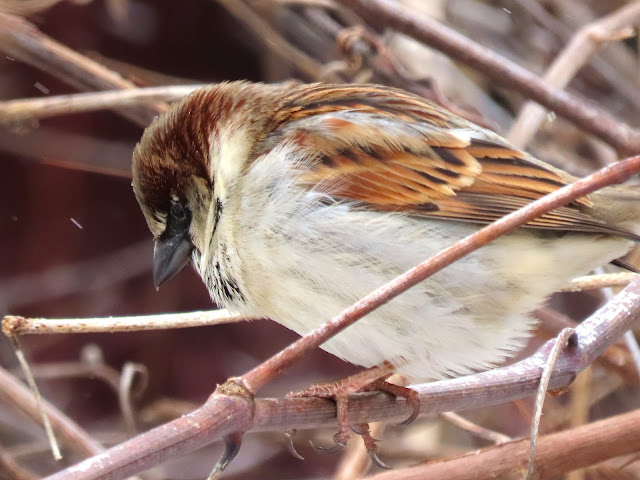".....when will we run the world with the needs of wildlife in mind, with nature twined throughout our lives in towns, villages and cities; when its necessity, value and wonder will be recognized and integrated into the strategies of industry, agriculture, parks and gardens?"
Sarah Gibson
22 January, 2024
Balzer Creek Trail, Kitchener, ON
I will be leading a walk in April for the City of Kitchener Public Library, Country Hills Branch, and wished to explore the area to locate a suitable venue for a spring outing.
Miriam came with me and together we marched for a considerable distance along a ribbon trail that threads its way through subdivisions, all the while delivering lots of wildlife, with the potential for exciting possibilities when spring migration will be underway, the forest floor will be greening up and insects will be stirring.
As I have reported in the past, American Robins (Turdus migratorius) are ever more frequently, and in greater numbers, eschewing migration in favour of remaining here for the winter. Winters are increasingly more benign, and enterprising birds can make a living. The phenology of many organisms is changing in response to climate perturbation.
Robins have learned to exploit microclimates, find suitable conditions in sheltered ravines, and secure food without great difficulty.
While not especially prone to land on bird feeders, robins eagerly take advantage of seeds spilled on the ground, and many houses backing onto this trail provided easy provisions for these birds.
It was a great pleasure for us to see so many.
Dark-eyed Junco (Junco hyemalis) was also very common, the flash of its white outer tail feathers signalling its presence as it zoomed away in rapid flight.
It was heartening to see that a snag had been left standing, to provide food and habitat for a variety of organisms. Standing dead wood is so important to a functioning ecosystem.
From time to time, the trail opened up, and a pleasing mix of habitat augers well for a variety of organisms on a spring walk.
Everyone should take the time to really look at a House Sparrow (Passer domesticus) to appreciate what a truly handsome little bird it is.
Downy Woodpecker (Dryobates pubescens) is our smallest woodpecker and our most common. This male was in splendid condition and looked quite regal.
Partly concealed in the treetops was a Red-tailed Hawk (Buteo jamaicensis), our most widespread raptor.
As a top predator Redtails are important in keeping the population of rodents under control, and illustrate the vital role of predation in maintaining the ecological balance in a healthy ecosystem.
A Northern Cardinal (Cardinalis cardinalis) is loved by all.
If you'd like to accompany me on this walk on 2 April you'll need to register with the library (519 743-3558).
Perhaps I'll see you then.
28 January, 2024
Mill Race Trail, St. Jacobs, ON
Before getting into the car we noticed a scattering of feathers on the driveway; it appears that a Dark-eyed Junco met its demise here.
It's wonderful to have any bird alight on your hand but a nuthatch is a particular joy since it tends to stay there for a while. It picks up one seed and drops it in favour of another, goes through the same routine again, gobbles one down, and then selects another to hide for later consumption.
If you have never had this kind of intimate contact with a wild creature, especially a small one that has no defences against a human a hundred times its size, you have missed one of the most joyous experiences in life. I do it routinely yet it never gets old, never loses its allure, never fails to remind me of my connection to all other living things.
There was even a hint of ice on the water.
I would be happy taking a wager, that on your finest day you didn't come close to the beauty of a drake Mallard (Anas platyrynchos).
Neither Miriam nor I could recall reports of strong winds in the area, but it must have been the case, for there were several instances of broken branches.
On the way home we were thrilled to see a male Eastern Bluebird (Sialis sialia), a not unexpected sighting in recent year; doubtless more birds are remaining here in these tepid, insipid winters.











































